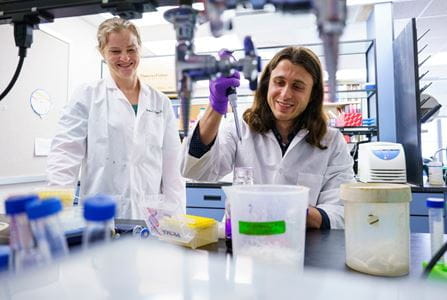INDIANAPOLIS — Researchers at the Indiana University Melvin and Bren Simon Comprehensive Cancer Center have identified a new potential therapeutic target for colorectal cancers with BRAF gene mutations, which occur in about 10% of metastatic colorectal cancers. Their findings, recently published in Molecular Cancer, provide new insights for addressing treatment-resistance to improve responses to cancer therapies.
The research is led by Heather O'Hagan, PhD, an associate professor of medical and molecular genetics at the IU School of Medicine—Bloomington and an investigator at the IU Simon Comprehensive Cancer Center.
"Patients who have colorectal cancer with this mutation have a worse overall survival compared to colorectal cancers that don’t have this mutation," O'Hagan said. "We are interested in finding ways to improve treatments that can increase survival."
Currently, the standard of care for patients with the BRAF V600E mutation and metastatic disease involves a combination of a BRAF inhibitor and an EGFR inhibitor. Despite this therapy, patients typically have a survival rate of only about nine months.
O'Hagan said colorectal cancers with a mutation in the BRAF gene cause the BRAF protein to remain in an "on state," driving cancer cell proliferation and cancer cell survival. Her research previously determined that BRAF-mutant colorectal cancers contain a specific cell type called an enteroendocrine cell, which are neuroendocrine cells of the intestine. These cells regulate appetite and immune responses in the normal intestine.
O'Hagan’s research showed that treating BRAF-mutant colon cancer models with the standard of care therapy resulted in an enrichment of enteroendocrine cells. Additionally, O'Hagan's lab showed that an epigenetic protein called LSD1 is critical for the formation of these cells during treatment. Existing LSD1 inhibitor therapies are being assessed in clinical trials for other cancer types.
"This gives us a potential opportunity for improving therapy response clinically," O'Hagan said. "By adding an LSD1 inhibitor, we could potentially keep the cancer cells in a state where they're most sensitive to the BRAF and EGFR inhibitors to improve treatment response in those patients."
Research collaborator and co-author Ashiq Masood, MD, provided insight for the study to ensure the work is clinically relevant for future translation to clinical studies. Masood is an associate professor of medicine at the IU School of Medicine, cancer center member and clinical oncologist.
For O'Hagan, this research is particularly meaningful due to a family history of cancer.
"This work is really about understanding the disease and finding better ways to treat it, especially as younger patients are increasingly being diagnosed with cancer," she said. "Our goal is to provide these patients with another 40 years of life."
Additional study authors include first author Christopher Ladaika, who performed the mechanistic and computational studies for this work, and Averi Chakraborty — both of whom are graduate students in the O'Hagan lab; Galen Hostetter, MD, of the Van Andel Institute; and Joo Mi Yi, PhD, of Inje University.
This research was supported by funding from the National Institutes of Health.
About the Indiana University School of Medicine
The IU School of Medicine is the largest medical school in the U.S. and is annually ranked among the top medical schools in the nation by U.S. News & World Report. The school offers high-quality medical education, access to leading medical research and rich campus life in nine Indiana cities, including rural and urban locations consistently recognized for livability. According to the Blue Ridge Institute for Medical Research, the IU School of Medicine ranks No. 13 in 2024 National Institutes of Health funding among all public medical schools in the country.
Writer: Candace Gwaltney, cmgwaltn@iu.edu
For more news, visit the IU School of Medicine Newsroom: medicine.iu.edu/news




